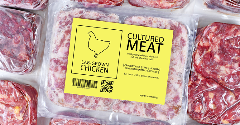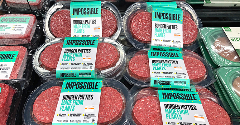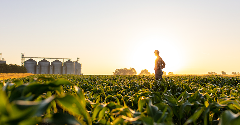News
FDA warns that tara flour does not meet its safety standards
13 Jun 2024The FDA has issued an official warning that tara flour in human foods does not meet the Generally Recognized as Safe (GRAS) standard, making it an unapproved additive.
Tara flour is derived from the seeds of the tara spinosa tree and is commonly farmed and sourced in mountainous regions throughout South America. The tara tree is native to Peru, but the flat yellow-orange pods bearing the seeds are also farmed as far afield as Venezuela and southern Argentina.

While the tara pods are processed into a number of compounds for industrial purposes, most commonly tannins for leather, one part of the seed can be processed into a gum that is used as a thickening agent in foods, while another part has traditionally been milled into a flour that contains a high level of protein.
Insufficient data to prove tara flour safety
But while there is extensive data to prove the efficacy and safety of the gum, the FDA says that data on the safety of tara flour is lacking. The FDA was contacted for comment about its ruling but did not immediately respond.
The FDA was prompted to assess the safety of tara flour after more than 400 cases of adverse reactions were reported by consumers of a leek and lentil crumble product manufactured by Daily Harvest. The company identified tara flour ingredient as the most probable cause for the adverse reactions.
“The firm took prompt action to voluntarily recall the product and conduct their own root cause analysis, during which they identified tara flour as a possible contributor to the illnesses. To date, the FDA has found no evidence that tara flour caused the outbreak; however, it did prompt the agency to evaluate the regulatory status of this food ingredient,” the FDA stated in an official post to its website.
Tara flour is now an unapproved food additive
On 15 May, 2024, the FDA took the decision to declare tara flour as an unapproved food additive, after the assessment period, which it detailed in a memorandum posted in April, 2024.
The memorandum made reference to several documented cases in the US of tara flour as the cause of various adverse symptoms in consumers, including the Daily Harvest crumble product and Revive Superfoods Mango & Pineapple Smoothie. Symptoms ranged from irritable bowel syndrome to liver damage.
“The serious adverse events and liver injury with food products containing tara flour raise serious safety questions. Overall, at this time, the available data are insufficient to support the safety of tara flour for use as a food ingredient that will be consumed by the general public,” the memorandum stated.
Was the FDA slow to react over tara flour ruling?
While the US FDA says that it is not currently aware that any food product is being sold in the country that contains tara flour, the organisation’s slow reaction has been criticised, especially in light of the fact that Canadian authorities chose to ban the ingredient in September 2023, following an extensive independent investigation.
In the US, the debate over loopholes in GRAS has led to several legislations at a state level in an attempt to plug perceived gaps. The California Food Safety Act has successfully banned a number of potentially toxic additives that are either manufactured or sold in the state. The bill was passed at the beginning of 2023 and is expected to come into force at the beginning of 2027.
New York state followed suit, introducing a bill in February of this year that aims to prevent the food industry from exploiting GRAS determination and using food additives that do not have proven safety for human consumption. If the bill is approved, it would require businesses to notify the State of New York when using a GRAS approved substance and marketing it for human consumption in the state of New York.
Related news

UK consumers could be eating cultivated meat within two years
26 Mar 2025
Cell-cultivated products (CCPs), from chicken nuggets to beefburgers, could be on UK supermarket shelves by 2027 after regulators launched a sandbox to accelerate approvals.
Read more
Protein diversification: A massive missed market?
20 Feb 2025
Germany and the UK could be missing out on the massive market for alternative meats and proteins, with one new coalition calling for an end to the “steak-tofu struggle”.
Read more
Most consumers lack trust in AI, but supplement users are ready to embrace the technology
14 Feb 2025
A survey of UK and US consumers found that most supplement users are willing to let AI make decisions on their behalf, but they also demand greater transparency.
Read more
Indians enjoy first bites of cultivated chicken
13 Feb 2025
The first public tasting of cultivated meat in India has taken place as the country prepares for the first commercial cultivated meat products – potentially as early as the end of this year.
Read more
UK publishes latest food security report
12 Feb 2025
The UK government releases its food security report 2024, detailing five core themes for bolstering and securing the future of the country’s food.
Read more
Leading regulatory updates in Asia in 2025
7 Feb 2025
As we head into 2025, numerous legislators around Asia are suggesting and solidifying legal updates and changes that will impact the food and beverage space.
Read more
Singapore introduces Food Safety and Security Bill
3 Feb 2025
Amid growing food safety concerns and supply chain disruptions, the Singapore Food Agency passes its Food Safety and Security Bill (FSSB) to provide greater clarity, assurance, and credibility.
Read more
Impossible Foods secures reinstatement of EU patent for heme protein
28 Jan 2025
The decision overturns the 2022 revocation of the patent and solidifies legal protection of the innovative ingredient that can be used in plant-based food production.
Read more
US wins GMO corn trade dispute with Mexico
24 Jan 2025
A Mexican decree banning imports of genetically modified (GM) corn for human consumption has been overturned in what has been hailed as a victory for US exports.
Read more
EU Parliament passes stricter packaging rules
20 Jan 2025
The European Parliament voted to approve updates to the packaging and packaging waste regulation, including enforceable re-use targets, limits on certain single-use packaging types, and restrictions on the use of PFAS “forever chemicals”.
Read more